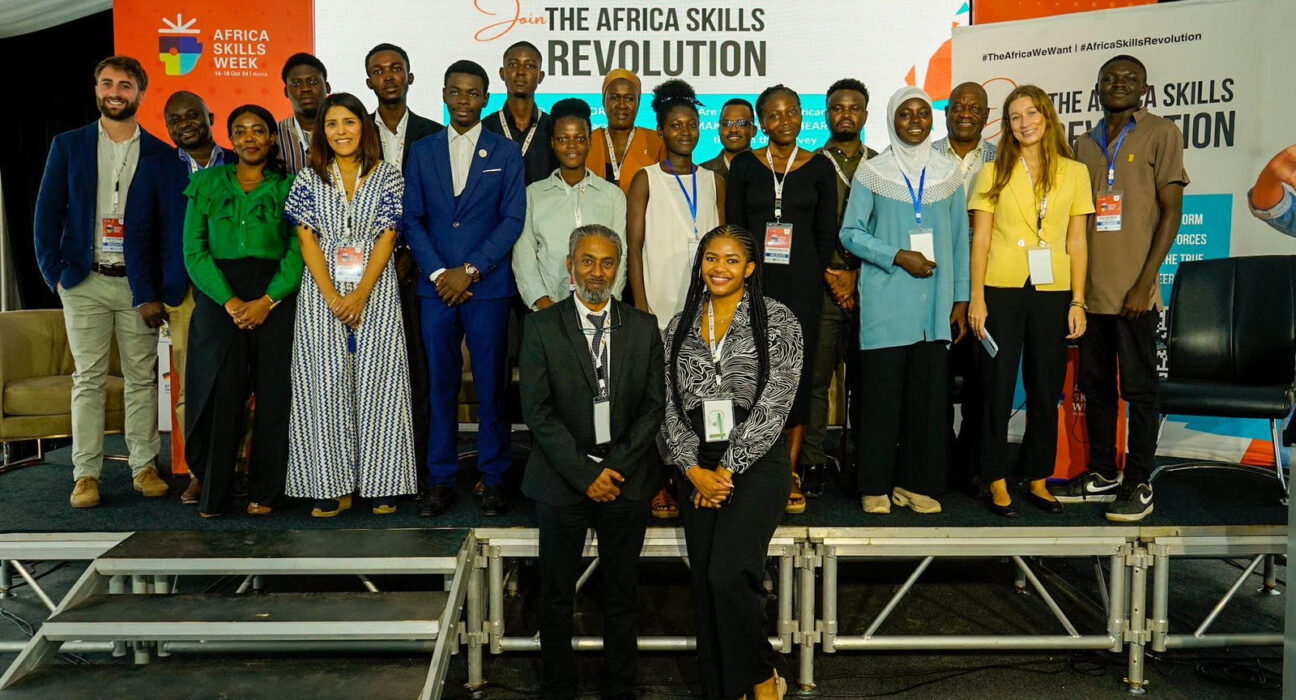Ten young entrepreneurs from across Africa, including two Kenyans, have been named winners of the Africa Skills Revolution Competition, organized by AUDA-NEPAD in partnership with Humana People to People. The competition, which took place from August 26 to September 26, highlighted the impact of Technical and Vocational Education and Training (TVET) on sustainable development and economic growth across the continent.
The winners were announced during the Africa Skills Week event held from October 14-18 in Accra, Ghana, where the competition’s success stories and innovative projects were celebrated. Among the winners were Huda Arbab, founder of Craft for Life Business, and Ochieng Benedict Onyando, a passionate advocate for skills development, both representing Kenya in the prestigious event.
The Africa Skills Revolution competition is part of a broader effort to reshape the narrative around TVET in Africa, highlighting how practical skills can empower young Africans to solve local challenges and build stronger economies. The initiative, launched during the African Union Year for Education 2024, aims to elevate the status of vocational training by showcasing the real-world impact of skilled professionals.
“Across the continent, we see young people driving progress in their communities. They are not just learning skills—they are using those skills to make a real, positive impact on the ground,” said Mr. Symerre Grey-Johnson, Director of Human Capital and Institutional Development (HCID) at AUDA-NEPAD.
The competition attracted 490 participants from 36 African countries, with winners selected based on their passion, ability to inspire, and contributions to social and economic growth through TVET. The recognition of Kenyan participants underscores the country’s role as a hub for innovation and youth-driven change in Africa.
Huda Arbab, one of the Kenyan winners, is the founder of Craft for Life Business based in the Kakuma refugee camp. Huda’s venture focuses on creating market opportunities for women in the camp who produce handmade goods. Her work has gained traction in global markets as the demand for unique, ethically-sourced products grows.
“In the Kakuma refugee camp, many women are facing tough economic and social challenges. The market for our handmade products is growing globally with the increased demand for unique materials and ethically-made items,” said Huda. Her initiative not only provides a source of income for women in the camp but also challenges stereotypes about refugees by showcasing their creativity and entrepreneurial spirit.
Another Kenyan winner, Ochieng Benedict Onyando, has been instrumental in supporting skills training programs that equip youth with practical knowledge and job-ready skills. Ochieng’s work in the TVET sector has emphasized the importance of hands-on training for creating employment opportunities and fostering economic resilience.
The Africa Skills Revolution is more than just a competition—it is a movement designed to change perceptions of TVET across the continent. Vocational education is often viewed as a secondary option, yet it holds the potential to unlock Africa’s youth potential, especially in sectors like agriculture, manufacturing, and creative industries.
Luckson Soda, Director of DAPP Zimbabwe—Humana People to People’s delivery partner—praised the competition’s participants for their creativity and innovation. “Their projects reflect the creativity and innovation that TVET fosters. These young people are proving that vocational education offers powerful tools for addressing some of the world’s most pressing challenges,” he noted.
As part of the broader Africa Skills Revolution Initiative, the competition aims to boost the profile of TVET through an advocacy campaign and a survey that gives young Africans a platform to express their vision for the continent’s future. By showcasing success stories, AUDA-NEPAD and its partners hope to change how TVET is perceived and to demonstrate its critical role in driving Africa’s economic transformation.
The winners of the Africa Skills Revolution Competition serve as examples of how TVET can transform lives and communities. Their stories emphasize that with the right skills and support, young Africans can become the architects of a more prosperous continent.
Naleh Befii Victory, another winner from Nigeria, shared her vision for using fashion to drive social change. “My passion and vision are to transform the African fashion industry, proving that creativity can drive social change and economic growth,” she stated. Her work at the TVET Centre, A+ Agency Fashion Academy, has become a source of inspiration for other young people across the region.
By offering a platform to these young leaders, the competition aims to inspire more youth to pursue careers in vocational training and recognize TVET as a pathway to sustainable development. As Kenya and other African countries invest more in skills development, the long-term goal is to create a generation of skilled workers who can contribute to economic growth and tackle local challenges effectively.
As the Africa Skills Week in Accra draws to a close, participants and organizers are calling for increased investment in skills training programs across the continent. By equipping youth with the skills they need to succeed, Africa can unlock new economic opportunities and build resilient communities.
The success of Kenyan participants like Huda Arbab and Ochieng Benedict Onyando highlights the potential of Kenya’s young people to lead change, not just locally but across Africa. With the support of initiatives like the Africa Skills Revolution, Kenya is poised to strengthen its position as a leader in youth innovation and skills development.
The Africa Skills Revolution Competition has put a spotlight on the role of vocational training in building a better future for Africa. As young innovators from across the continent continue to showcase their talents, the recognition of Kenyan participants underscores the potential of TVET to drive meaningful change. By investing in skills development, Africa can nurture a new generation of leaders capable of transforming their communities and economies.
As AUDA-NEPAD and Humana People to People continue to push for greater recognition of TVET, the stories of this year’s winners serve as a reminder that with the right skills, young Africans can achieve remarkable things.





